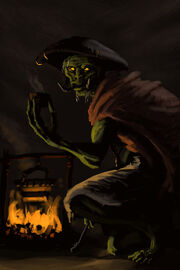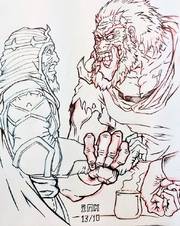- "As sour-tempered a writer as I've ever had the displeasure of reading."
- ―Heboric
Gothos was the Jaghut guardian of the Deadhouse in Malaz City. He was the father of both Icarium and the Tyrant Raest.[1][2] Gothos was a brother to Gethol.[3]
Gothos' Folly was one of his best known literary works, and was occasionally cited throughout the series. He was also the author of A Life in Mists.
He was over seven feet tall and gaunt, with greenish skin and long grey hair which he wore tied back. His huge tusks curled from his lower jaw on either side of a wide, slit mouth. A pronounced brow ridge hid his eyes, which were the colour of dirty ice. He spoke in a low, rumbling voice. His resemblance to Icarium was unmistakeable.[4][5]
Mappo Runt argued that "Gothos's curse was in being too aware--of everything. Every permutation, every potential. Enough to poison every scan he cast on the world. It availed him naught, and worse, he was aware of even that."[6]
In Deadhouse Gates
Fiddler, Apsalar, Crokus Younghand, and Rellock traveled through the Azath warren from Tremorlor to the Deadhouse. There they met Gothos, the house's guardian. Gothos expressed his annoyance that the group had failed to orchestrate Icarium's imprisonment in Tremorlor before quickly apologizing. He explained that Icarium's problems with memory were a result of his son's failed attempt to free his father from the Azath. His son did not understand that he enjoyed the peace and solitude of guardianship, and as a result was forever scarred and no longer even remembered his father. Gothos offered the group a healing drink before asking them to vacate the house.[7]
In Memories of Ice
It was hinted that Gothos had an estranged relationship from his brother Gethol. First, the Crippled God spoke of a time when Gethol had failed Gothos when his brother had called upon him. Gethol interrupted the god before he could go into further detail.[8]
Later, Kallor referred to Gothos as the smarter brother and said he must be laughing at Gethol's misfortune. Gethol countered by saying his brother never laughed, but Gethol did whenever he thought of the place where his brother languished.[9]
In Toll the Hounds

Interpretation of Gothos by Simon Underwood
An Elder Azath Builder (called 'Elder'), a gigantic being (roughly 'four stories high'), was a mason who built Azath Houses, but was essentially a prisoner of Gothos - Elder being kept in an unnamed Warren to which only Gothos normally had easy access. Nimander Golit and his party of Tiste Andii close kin and Kallor came upon a ruined tower that Gothos was then inhabiting, as the group was travelling to Bastion in central Genabackis. Having taken tea with Gothos, Nimander then accidently fell through a 'gate' inside the ruined tower and in so doing met the Elder in the Warren where Gothos had him trapped. The Elder and Nimander talked and Nimander learned that, although the Elder would build Azath Houses, each time Gothos always managed it so that he (and not the Elder) would vanish with the newly completed House - leaving the Elder behind (helping to explain how Gothos managed to travel to other Azath Houses and from there to their realms - unlike other Azath House guardians). Nimander finally figured out a way to circumvent this practice of Gothos, however, and after the Elder proceeded to build a new Azath, this time the Elder vanished along with the House when it was finished - finally freeing the Elder Azath Builder, and allowing him to build Azath Houses where and when he pleased.[10]
In Forge of Darkness

Interpretation of Gothos by McDev
Gothos was known as the Lord of Hate, living in a nondescript building below the Tower of Hate. On the Night of Dissension, he had convinced the Jaghut that their civilization was a "misapprehension of purpose" and "a belated recognition of economic suicide." It was destined to advance until it collapsed. So the Jaghut civilization walked away from its future and broke apart into solitary individuals leaving Gothos as nearly the only resident of the once great Jaghut city of Omtose Phellack.[11] Gothos imprisoned Hood within his dungeon to prevent him from declaring war on the Azathanai after Errastas and Sechul Lath had killed Hood's wife, Karish.[12] He allowed Draconus to free Hood, but warned that Hood would declare a war on death itself.[13] Draconus left his son Arathan to help Gothos continue his work on his Folly.[14]
In Dancer's Lament
Gothos was currently residing in a tomblike underground structure on the Seti Plains, near the Great Cliff and to the south of the Idryn.[15] He called the structure his retreat. Pursuing Wu, Dorin Rav entered a small tunnel leading downwards into the structure, where they met Gothos, who was examining a casting of the Deck of Dragons which he had been unable to interpret for thousands of years, and a Nacht. A fit of annoyance threw Wu, Dorin, and the nacht to the walls with a burst of Gothos' power. Gothos released Dorin and Wu on the condition that they would take the nacht with them. After they left, Gothos briefly conversed with a Battered full helm, which accused Gothos of giving up too easily.[16]
Quotes

Gothos and Kallor by Shadaan
- "He is such a fool I fear my heart will burst."
- ―Gothos regarding Hood's war on death
- Draconus: "How many volumes have you compiled thus far, Gothos?"
- Gothos: "An even dozen stacks to match the one on the desk. Written in an execrable hand, every word, every line."
- Draconus: "Not in Old Jaghut, I trust!"
- Gothos: "Of course not! That would be... ridiculous. A language for the compilers of lists, a language for tax collectors with close-set eyes and sloping foreheads, a language for the unimaginative and the petty-minded, a language for the unintelligent and the obstinate--and how often do those traits go hand in hand? Old Jaghut? Why, I would have killed myself after the first three words!"
- Gothos: "If only I had. I confess, Suzerain, I have indeed written in Old Jaghut."
- ―Draconus and Gothos on Gothos' Folly[src]
Notes and references
- ↑ Toll the Hounds, Chapter 8, UK HB p.285
- ↑ Deadhouse Gates, Chapter 23, US HC p.574
- ↑ Memories of Ice, Chapter 8, UK HB p.349
- ↑ Forge of Darkness, Chapter 16, UK HC p.517
- ↑ Deadhouse Gates, Chapter 23, US HC p.574
- ↑ Deadhouse Gates, Chapter 3, US HC p.100
- ↑ Deadhouse Gates, Chapter 23, US HC p.574-575
- ↑ Memories of Ice, Chapter 8, US SFBC p.295
- ↑ Memories of Ice, Chapter 13, US SFBC p.440
- ↑ Toll the Hounds, Chapter 8, US TPB p.260-264/267-270/271-273/274
- ↑ Forge of Darkness, Chapter 3, UK HC p.55
- ↑ Forge of Darkness, Chapter 11, UK HC p.322
- ↑ Forge of Darkness, Chapter 16, UK HC p.521
- ↑ Forge of Darkness, Chapter 16, UK HC p.520
- ↑ Dancer's Lament, Prologue, US TPB p.1
- ↑ Dancer's Lament, Prologue, US TPB p.3-10
